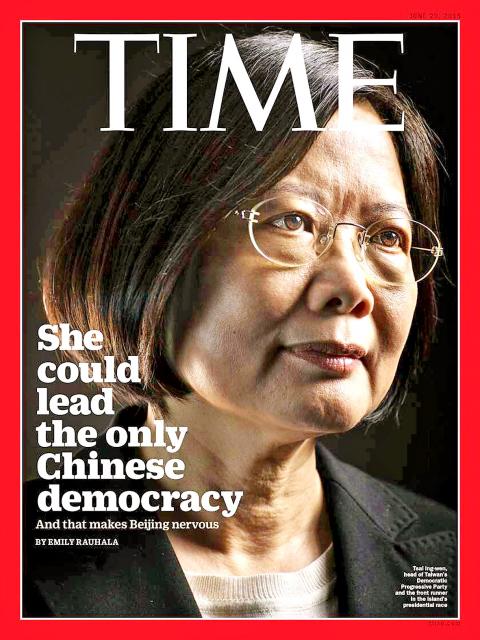The latest Asia edition of Time magazine is to print an interview with Democratic Progressive Party (DPP) Chairperson Tsai Ing-wen (蔡英文) — with the cover to feature her photograph — introducing her political background, while portraying her as a confident politician with a sense of humor.
“My purpose in giving the interview was to allow the international community to understand Taiwanese determination to defend values of democracy, and I’m glad that Time chose to make it a cover story and speak so much about the nation’s democratic development,” Tsai said on the sidelines of a campaign event in New Taipei City. “During the interview, I specially reminded the international community to pay attention to recent developments in Taiwan, especially after the Sunflower movement last year. Society now has a different expectation of the future.”
With the headline: “She could lead the only Chinese [sic] democracy,” a Time subheadline is to say: “That could make Beijing nervous.”

Photo: CNA
Tsai said it is a shared responsibility across the Taiwan Strait to maintain peace and stability.
“We want the international community to understand that it is everyone’s shared responsibility to maintain peace and stability,” Tsai said. “We especially stressed the DPP’s determination to maintain cross-strait peace and stability, and we hope everyone will work together to enhance stability and peace across the Taiwan Strait.”
In the interview, Tsai said that she would try to maintain the cross-strait “status quo,” while putting “Taiwan’s economy, development and culture first” in her policy platforms if elected.
She said that her policies would be Taiwan-centric, as opposed to President Ma Ying-jeou’s (馬英九) focus on pushing for new trade and tourism pacts with China.
The report said Tsai was “vague” on the independence-unification issue, as it was not made clear whether the DPP would repeal its stance on independence. On the issue of unificaiton, Tsai said: “It is something you have to resolve democratically — it is a decision to be made by the people.”
The interview said Tsai expressed confidence over her election chances.
Emily Rauhala, a Time reporter in Beijing who penned the article, said that Tsai offered her the last piece of tuna while they were at a Taiwanese-Japanese fusion restaurant in Kaohsiung and said: “Go back to Beijing and tell them you were served by the next president of Taiwan.”
“Tsai is quietly confident that she will gain the trust of Taiwan’s voters and secure victory, whatever Beijing might think,” Rauhala said.

Tropical Storm Gaemi strengthened into a typhoon at 2pm yesterday, and could make landfall in Yilan County tomorrow, the Central Weather Administration (CWA) said yesterday. The agency was scheduled to issue a sea warning at 11:30pm yesterday, and could issue a land warning later today. Gaemi was moving north-northwest at 4kph, carrying maximum sustained winds near its center of up to 118.8kph and gusts of 154.8kph. The circumference is forecast to reach eastern Taiwan tomorrow morning, with the center making landfall in Yilan County later that night before departing from the north coast, CWA weather forecaster Kuan Shin-ping (官欣平) said yesterday. Uncertainty remains and

SEA WARNING LIKELY: The storm, named Gaemi, could become a moderate typhoon on Wednesday or Thursday, with the Taipei City Government preparing for flooding A tropical depression east of the Philippines developed into a tropical storm named Gaemi at 2pm yesterday, and was moving toward eastern Taiwan, the Central Weather Administration (CWA) said. Gaemi could begin to affect Taiwan proper on Tuesday, lasting until Friday, and could develop into a moderate typhoon on Wednesday or Thursday, it said. A sea warning for Gaemi could be issued as early as Tuesday morning, it added. Gaemi, the third tropical storm in the Pacific Ocean this typhoon season, is projected to begin moving northwest today, and be closest to Taiwan on Wednesday or Thursday, the agency said. Today, there would likely

DISRUPTIONS: The high-speed rail is to operate as normal, while several airlines either canceled flights or announced early departures or late arrivals Schools and offices in 15 cities and counties are to be closed today due to Typhoon Gaemi, local governments announced last night. The 15 are: Taipei, New Taipei City, Taoyuan, Tainan, Keelung, Hsinchu and Kaohsiung, as well as Yilan, Hualien, Hsinchu, Miaoli, Chiayi, Pingtung, Penghu and Lienchiang counties. People should brace for torrential rainfall brought by the storm, with its center forecast to make landfall on the east coast between tonight and tomorrow morning, the Central Weather Administration (CWA) said. The agency issued a sea warning for the typhoon at 11:30pm on Monday, followed by a land warning at 11:30am yesterday. As of

CASUALTY: A 70-year-old woman was killed by a falling tree in Kaohsiung as the premier warned all government agencies to remain on high alert for the next 24 hours Schools and offices nationwide are to be closed for a second day today as Typhoon Gaemi crosses over the nation, bringing torrential rain and whipping winds. Gaemi was forecast to make landfall late last night. From Tuesday night, its outer band brought substantial rainfall and strong winds to the nation. As of 6:15pm last night, the typhoon’s center was 20km southeast of Hualien County, Central Weather Administration (CWA) data showed. It was moving at 19kph and had a radius of 250km. As of 3pm yesterday, one woman had died, while 58 people were injured, the Central Emergency Operation Center said. The 70-year-old